Regarding Some Proverbs that Praise Women
DOI:
https://doi.org/10.18778/1505-9065.16.07Keywords:
proverb (s), paremiology, lexicography, woman, feminismAbstract
The proverb reflects social realities and popular beliefs. It can be considered within the framework of a comparative paremiology, so that we undertake this study as a contribution to the French- Spanish-Galician phraseological dictionary. We have resorted to whole paroemias in the French languages, belonging to different times and without the limitation of an Eurocentric perspective, basing ourselves on this Francophone culture, as a linguistic, cultural and sociological ensemble of the Francophonie. This field of work has been restricted to proverbs relating in some way to love, in the broad sense, associated with the female figure, as a source of fulfilment, of discernment, of opulence, in her role as irreplaceable mother or as an equal to the man. It is only a question of those which praise or transmit a positive aspect of women, at least in one of their possible interpretations, unlike the others, much more usual and numerous, which offer a negative image.
Downloads
References
ÁLVAREZ DE LA GRANJA, María (2003), « Proposta de clasificación semántico-funcional das unidades fraseolóxicas galegas », Cadernos de fraseoloxía galega, n° 4, p. 1-26
Google Scholar
ANSCOMBRE, Jean-Claude (1994), « Proverbes et formes proverbiales : valeur évidentielle et argumentative », Langue française, n° 102, p. 95-106
Google Scholar
DOI: https://doi.org/10.3406/lfr.1994.5717
ARNAUD, Pierre (1992), « Réflexions sur le refrain », Cahiers de Lexicologie, n° 59/2, p. 6-27
Google Scholar
BELAMRI, Rabah (1986), Proverbes et dictons algériens, Paris, L’Harmattan
Google Scholar
BISIGNANI, Thomas, ISAERT, Benoit (2014), Proverbes à la con – Mieux vaut être bon à rien que mauvais à tout, Paris, First
Google Scholar
CLAVER ZOUOGBO, Jean-Philippe (2009), Le proverbe entre langues et cultures : une étude de linguistique confrontative, Berne, Peter Lang
Google Scholar
CONDE TARRÍO, Germán (1998), « La verdad en el refranero : los refranes meteorológicos gallegos », Paremia, n° 7, p. 61-68
Google Scholar
CORPAS PASTOR, Gloria (1996), Manual de fraseología española, Madrid, Gredos
Google Scholar
DESALMAND, Paul, STALLONI, Yves (2013), Proverbes expliqués, Paris, Éditions du Chêne
Google Scholar
FERNÁNDEZ PONCELA, Anna María (2015), Amor, matrimonio y etapas de la vida. Discurso didácticomoral y consejos prácticos en el refranero español, Valladolid, Fundación Joaquín Díaz
Google Scholar
GARCÍA-PAGE, Mario (2008), Introducción a la fraseología española, Barcelona, Anthropos
Google Scholar
Génesis: II, 24
Google Scholar
GŁOWICKA, Monika (2007), « Visión de la familia en los refranes españoles », Estudios Hispánicos, n° 15, p. 265-275
Google Scholar
GROSS, Maurice (1982), « Une classification des phrases “figées” du français », Revue québécoise de linguistique, n° 11, p. 151-185
Google Scholar
DOI: https://doi.org/10.7202/602492ar
INSTITUTO CERVANTES (1997), Refranero multilingüe, Madrid. https://cvc.cervantes.es/lengua/refranero/Busqueda.aspx consulté le 09 octobre 2019
Google Scholar
KLEIBER, Georges (1988), « Sur la définition du proverbe », Europhras 88. Phraséologie contrastive, p. 233-252
Google Scholar
LADMIRAL, Jean-René (1999), « Sur la philosophie de la culture impensée de la traduction », Parcours, passages et paradoxes interculturels, p. 141-164
Google Scholar
LÁZARO CARRETER, Fernando (1980), Estudios de lingüística, Barcelona, Crítica
Google Scholar
Les Proverbes de Salomon XVIII, (22)
Google Scholar
LORENZO FERNÁNDEZ, Xaquín (1983), Refraneiro Galego, Vigo, Castrelos
Google Scholar
MÉNAGE, Gilles (1654), Menagiana ou bons mots, rencontres agréables, pensées judicieuses et observations curieuses, Paris, Pierre Delaulne. https://reader.digitale-sammlungen.de/de/fs1/object/display/bsb11342763_00006.html consulté le 05 octobre 2019
Google Scholar
MOREIRAS SANTISO, Xosé (1978), Os mil e un refráns galegos da muller, Lugo, Alvarellos
Google Scholar
NORRICK, Neal (1985), How proverbs mean : semantic studies of English proverbs, Berlin, Mouton
Google Scholar
DOI: https://doi.org/10.1515/9783110881974
OULD EBNOU, Mohamedou, OULD MOHAMEDEN, Moussa (2008), Encyclopédie de la Culture Populaire Mauritanienne – Contes et Proverbes de Mauritanie, vol. III, Paris, L’Harmattan
Google Scholar
PAMIES BELTRÁN, Antonio, LUQUE DURÁN, Juan de Dios, FERNÁNDEZ MARTÍN, Patricia (2011), Paremiología y herencia cultural, Granada, Granada Lingüística
Google Scholar
QUITARD, Pierre-Marie (1861), Proverbes sur les femmes, l’amitié, l’amour et le mariage, Paris, Garnier Frères. https://gallica.bnf.fr/ark:/12148/bpt6k5462189b.texteImage consulté le 27 septembre 2019
Google Scholar
RODEGEM, François-Marie (1973), « Un problème de terminologie : les locutions sentencieuses », Cahiers de linguistique de Louvain, n° 1/5, p. 678-703
Google Scholar
RODRIGUEZ FERREIRO, Verónica (2017), Refrans & Proverbes. http://refrans-proverbes.com consulté le 20 septembre 2019
Google Scholar
SCHIPPER, Mineke (2008), Belle femme, gros ennuis – Les femmes en proverbes du monde entier, Paris, Philippe Rey
Google Scholar
SESTO LÓPEZ, Xosé (1976), Refraneiro da muller, Vigo, Castrelos
Google Scholar
TÊTU, Michel (1992), La Francophonie : Historie, problématique et perspectives, Chamonix, Guérin
Google Scholar
THÉROND, Maurice (1972), Du tac au tac : formules, réflexes et images de la conversation française actuelle, Paris, Marcel Didier
Google Scholar
ZAMORA MOSQUERA, Federico (1972), Refráns e ditos populares galegos, Vigo, Galaxia
Google Scholar
ZULUAGA OSPINA, Alberto (1975), « La fijación fraseológica », Thesaurus, XXX, n° 2, p. 225-248
Google Scholar
Downloads
Published
How to Cite
Issue
Section
License

This work is licensed under a Creative Commons Attribution-NonCommercial-NoDerivatives 4.0 International License.













